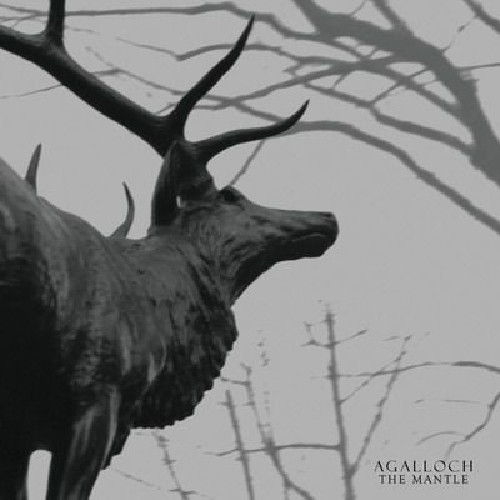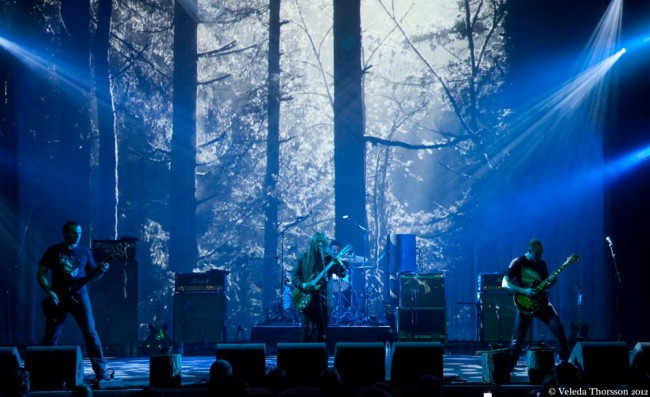
Yesterday marked the 10th anniversary of the release by Agalloch of their second full-length, The Mantle. Also yesterday, our brother in blog, Full Metal Attorney, devoted another one of his album-anniversary retrospectives to The Mantle, and as I’ve done before, I’m using his piece as what I hope will be a jumping-off point for discussion here at NCS.
This particular anniversary recognition means more to me than others we’ve featured here. The Mantle was my introduction to Agalloch, who have become one of my favorite bands, and the album itself was a revelation to me. FMA contends that it represented “two radical changes in metal”, which slowly gained in prominence after the album’s release. First, he states that it represented a form of “[m]etal that’s barely even metal” – “neo-folk music with some black metal elements, rather than the other way around.”
Second, he argues that it represented a shift “away from individual songs and toward complete albums”, a kind of cinematic music in which mood is paramount: “The songwriting is brilliant not because of monster riffs, but because it creates atmosphere and holds it together with memorable melodies and musical themes. In that sense, it resembles classical music more than any kind of rock music.”
While acknowledging that other bands such as Ulver had previously been creating music with a “neo-folk-infused musical style and cinematic/classical songwriting”, FMA asserts that “no one plying this trade had made such a strong statement as The Mantle” and that “[p]agan metal and post-black metal would be unrecognizable (or non-existent) today were it not for this record.” And to push the point even further, he states, “By extension, the nation of Ireland would have zero presence on the international metal stage.”

The Mantle is indeed difficult to classify as metal, with heavy use of acoustic instruments and John Haughm’s clean vocals predominating over his harsh black metal shriek. The music is often soft, beautiful, and steeped in melancholy, and the lyrics explore a variety of serious spiritual themes including the clash of modern culture and technology with nature.
The un-metalness of the album soured some “critics”, who classified the music as too pretty, too “easy”, monotonous, and dull. Undoubtedly those same types of listeners would bemoan how influential the album indeed was, blaming Agalloch for the rise of long-form atmospheric black metal devoted to mood (and often with a nature-centric focus), with varying degrees of neo-folk influence and acoustic additions. From that perspective, Agalloch was the dentist who pulled black metal’s teeth.
I don’t share that view any more than FMA, and I’ve argued the point in person with a surprising number of people who seem to classify The Mantle as a type of elevator music. My most recent such encounter was at Agalloch’s recent show in Seattle, where I talked with a guy who had been “dragged” to the show by his girlfriend. Having seen Agalloch several times before, I tried to reassure him that the live set would be powerful — that it would definitely be metal — in part because I had heard before the way in which Agalloch transformed songs from The Mantle, such as its best track, “In the Shadow of Our Pale Companion”, by using electric guitar instead of acoustic.
I never saw the dude again, and so I don’t know if he was convinced. The conversation did make me think about Agalloch’s decision to “electrify” some of their more acoustically oriented material in live performances. I haven’t tried to look for explanations of the decision by the band, but it does make such songs sound more metal, more galvanizing, and less neo-folky. It also changes the songs, almost into new songs — and I think that’s a kind of bonus, because both versions are wonderful.
The Mantle isn’t my favorite Agalloch album. For me, that award goes to Ashes Against the Grain, but The Mantle probably was the more influential, in part because it came four years earlier. Would pagan metal and post-black metal have been unrecognizable or even non-existent today without The Mantle? That seems like an overstatement, but for all I know it could be true. I just haven’t really tried to trace the development of the genres and wasn’t closely listening to these styles of music in the two or three years following The Mantle‘s release.
I’ll close out this post by inviting you to go read Full Metal Attorney’s post about The Mantle here and then chime in with any thoughts you’ve got, either based on his post or this one or your own reactions to Agalloch’s music, whether good, bad, or indifferent.
In the meantime, here’s “In the Shadow of Our Pale Companion”:
[audio:https://www.nocleansinging.com/wp-content/uploads/2012/08/02-In-The-Shadow-Of-Our-Pale-Companion.mp3|titles=Agalloch – In The Shadow Of Our Pale Companion]

“The Mantle” was my first introduction to Agalloch as well, and it definitely helped shape my tastes in future metal releases. I didn’t read any critical reviews on it when it came out, but judged on the crowd continually shouting “Play ‘The Mantle!'” last time I saw Agalloch, I think a lot more people loved it than hated it.
I put quotes around the word “critics”, because I was really talking about self-anointed internet critics. You can see a smattering of that in the reviews at Metal Archives. I think the album was generally praised by more established metal writers.
No doubt “The Mantle” was influential. It was their big “F-you” to the stagnating metal scene. Well, maybe not quite, but in an interview on their DVD they said at the time they had become really disinterested in anything metal and started getting into a lot more post-rock, which was still pretty fresh back then. This album definitely helped bridge that gap between post-rock and metal among other bands such as Pelican, Isis, and Neurosis.
For me personally it’s an album I hold in high regard, but quite honestly listen to rarely. I respect it for what it is and how it helped Agalloch grow into what they are now, but for me “Ashes Against the Grain” is a far stronger album and “Marrow of the Spirit” is tied for first with it. Both are great in their own regard, I can’t really put one over the other.
Like you, I don’t listen to the album nearly as much as I have songs from Ashes and Marrow — though I do go back to the song I streamed in the post (and if memory serves, the band have played it live at every one of the 3 Agalloch shows I’ve attended).
I know a lot of people–much of Agalloch included–think the Mantle is their strongest record.
That may be–it’s not my favorite, but comparing Agalloch records is like comparing Opeth records. that is to say: pointless.
Certainly you can judge how great an album is by how many bad habits it spawns, and The Mantle spawned quite a lot of lazy atmospheric American BM. Still, it’s an excellent album from one of America’s finest bands.
Dare I say… kvlt classic?
Spot on. Every Agalloch record is great, each for their own different reasons.
I agree that trying to compare the albums is difficult because Agalloch has continually changed directions — especially in the course of their earliest releases. Maybe all anyone can do is just profess which one(s) they liked best or liked least — and maybe that’s what you’re saying? But in terms of quality, isn’t it possible to assess the strength of an album within the context of what the band was trying to do at the time and then rank them according to their relative degrees of success or failure?
Nice write-up. I like the focus you took a good deal. I was hoping to hear more argument about its impact and significance, though. In the world where The Mantle didn’t exist, what do Primordial and Alcest sound like? Is my contention that it’s one of the first truly album-oriented albums correct?
Thanks. I was expecting more debate, too. I guess when you;re right, you’re right. 🙂